- Home
- Donald Hamilton
The Wrecking Crew mh-2
The Wrecking Crew mh-2 Read online
The Wrecking Crew
( Matt Helm - 2 )
Donald Hamilton
Donald Hamilton
The Wrecking Crew
Chapter One
I AWOKE EARLY, shaved, dressed, draped myself with cameras and equipment, and went on deck to record our entry into the port of Gothenburg. I couldn't think of a likely market for the shots, but I was supposed to be an eager and ambitious free-lance photographer, and I'd be expected to be alert to the chance that somebody would fall overboard or the ship would hit something.
Nothing happened, and after we were safely docked I went down to breakfast, after which I came back up to the smoking room for passport inspection. Finally I was shunted down the gangplank into the arms of the Swedish customs, where I braced myself to justify my possession of a thousand bucks' worth of photographic gear and several hundred rolls of film, having been warned that European countries are touchy about this sort of thing. It was a bum steer. Nobody paid any attention to the cameras and film. The only part of my belongings that caused a mild official interest was the guns.
I explained that an editor in New York had arranged with a sporting character in Stockholm to have an import permit waiting for me at the dock. I was thereupon escorted down the long shed to an office where a blond young fellow shortly produced a document authorizing Herr Matthew L. Helm, of Santa Fe, New Mexico, USA, to transport into the kingdom of Sweden one raffia gevdr, Winchester, kaliber.30-06, and one hagelbцssa, Remington, kaliber 12.
The youthful customs man checked the serial numbers of the rifle and shotgun, then laid the weapons on a platform scale, wrote down the total weight in kilograms, consulted a table with this figure, and announced that the duty would be thirteen crowns. Having already learned that the Swedish crown was worth approximately twenty cents, I couldn't feel that the tariff was exorbitant, but it did seem like a funny way to assess it.
As I left the office, I soothed my conscience with the thought that by not declaring the aluminum-framed, five-shot Smith and Wesson.38 Special concealed in my luggage, I wasn't really cheating the Swedish government of much money-less than two bits, in fact-since it was a very light little gun.
It had been Mac's idea. "Your bona-fide literary and photographic background is going to come in very handy on this job," he'd said, giving me my instructions in his Washington office. "To be perfectly frank, it's the chief reason you were selected, in spite of the length of time that's passed since you were associated with us last. There's also the fact that you already know the language, after a fashion, and we haven't many operatives who do."
He'd looked up at me across the desk-a spare, gray-haired man of indeterminate age, with coal-black eyebrows and cold black eyes. Somehow he always managed to arrange his offices, wherever they might be (I could remember one in London with a grim view of bombed-out buildings) so that he had a window behind him, making it hard to read his expression against the light, which I suppose was the idea. "You've done articles for outdoor magazines in the past," he'd said. "What's more logical than for you to be working on a couple of hunting pieces in addition to your main photographic assignment? I'll get in touch with some people and fix it up for you."
I said, "There's going to be a lot of red tape with the guns. Other countries are more sensitive about firearms than we are."
"Precisely," he said. "That's just the point. You take a lot of trouble to get the proper papers for your hunting arms, all open and innocent, and who's going to suspect you of packing a revolver and a knife as well? Anyway, they've got some pretty wild terrain up there in northern Sweden where you're going. Who knows, a high-powered rifle may be just what you'll need."
It had still seemed like an unnecessary complication to me. I hadn't looked forward to juggling a rifle and a shotgun, plus a lot of hunting paraphernalia, in addition to the camera junk I was already saddled with by my role as photographer. However, as Mac had pointed out, I'd been out of touch for a long time; I wasn't familiar with the subtleties of peacetime operation. But I did remember clearly from the war that there were limits to the amount of argument Mac would tolerate from a subordinate, particularly when he felt he was being extremely clever.
"Okay," I said hastily. "You're the boss, sir."
I hadn't wanted him to change his mind about putting me back to work. And now I was landing on European soil again, after better than fifteen years, with the same old feeling that everybody was looking at me and my belongings with knowing, X-ray eyes.
There was bright sunshine outside the customs shed- well, as bright as you get in the fall that far north. It would probably have seemed like a pale and wintry day, back home in New Mexico. There was a wide, cobble-stoned street outside, full of weird, left-handed traffic. The Swedes, along with the British, persist in driving on the opposite side of the street from practically everybody else in the world.
There were two-and four-wheeled vehicles in just about equal numbers, with some oddly shaped three-wheelers thrown in for good measure. The taxi that took me to the railroad station was a German Mercedes. The train itself had an old-fashioned, unstreamilned look that was kind of refreshing. I disposed of my heavier baggage with the proper official, and started to get into one of the cars, but stepped back to let a woman board first.
She was quite a handsome young woman-from where I stand, thirty still qualifies as young-and she was wearing a severely tailored blue suit that did justice to her figure in a nice, understated way; but her hair, under the little blue tweed hat that matched her suit, was also blue, which seemed odd to me. Of course there was really no reason why a good-looking female of youthful appearance whose hair had turned white prematurely shouldn't dye the stuff blue if she wanted to.
I followed her aboard. She apparently knew her way around Swedish rolling stock better than I did. I lost track of her in the unfamiliar surroundings. It had been a long time since I'd last patronized a European railroad. This car was divided into small eight-passenger compartments marked either Rдkare or Icke Rцkare. Remembering from my Minnesota boyhood that rцka means smoke in Swedish, and icke means no, I had no trouble understanding the distinction, particularly since other signs gave the translation in German, French, and English.
I selected an empty nonsmoker and settled down by the window, which could be raised and lowered by means of a leather strap about four inches wide. I couldn't recall the last time I'd been on a train that wasn't sealed up tight for air conditioning, but of course they wouldn't need that here, in the shadow of the Arctic Circle. It was a long ride to Stockholm, through green, partly forested country interrupted by a multitude of lakes and streams, and accented with red barns and orange-red tile roofs.
Around three in the afternoon, a little late, having traversed the entire width of the country from west to east, the train entered the capital of Sweden across a long bridge over water; but it was twenty minutes more before I could extract my junk from the baggage room and transfer it to a waiting taxi. I'd got over my first feeling of stage fright. Nobody seemed to be paying the slightest attention to me now, except for some kids intrigued by my big Western hat. One of them came over and bobbed his blond head politely.
"Yes," I said, "what is it?"
"Ar farbror en cowboy?" he asked.
In addition to having had some contact with the language as a boy, I'd been given a quick refresher course-not only in the language, but in other subjects as well-before being sent out. But of course I wasn't supposed to understand a word, and somebody might be watching, so I looked blank.
"Sorry, I don't read you," I said. "Can't you put it into English?"
A woman's voice said, behind me, "He wants to know if you're a cowboy."
I looked around, and the
re she was again, blue suit, blue hair, and all. Bumping into her a second time didn't please me a bit. It wasn't a contact, because there was nobody here I was scheduled to meet in this manner; and I'd once survived a war mainly by putting no faith whatever in the power of coincidence. It still seemed like a sound principle to follow.
"Thank you, ma'am," I said. "Please tell the kid that I'm sorry, but I never roped a steer in my life. The hat and the boots are just for show."
This was another of Mac's fancy ideas. I was supposed to be something of a rustic Gary Cooper character, as well as a hunter and a camera-clicking screwball. Well, I had the height for it, if no other qualifications; but I couldn't help feeling, with this woman's eyes upon me, that the act I was being asked to put on was unnecessarily detailed and complicated, not to mention corny. However, I'd asked for the job-after first turning it down twice-so I wasn't in a position to complain.
The woman laughed, and turned to speak to the boy, in swift and fluent Swedish that had, however, a trace of an American accent. He looked disappointed, and ran off to tell his pals that I was a phony. The woman turned back to me, smiling.
"You broke his heart," she said.
"Yes," I said. "Well, thanks a lot for interpreting." I got into the cab, leaving her standing there. She had quite a pretty smile, but if she had some reason besides my masculine appeal for wanting to talk to me, she'd undoubtedly turn up again; and if she didn't, I had no time for her. I mean, I've never had any sympathy for agents who can't refrain from complicating their jobs with irrelevant females. The relevant ones usually present problems enough.
I rode away without looking back, bracing myself against the psychological impact of the cockeyed traffic, which seemed even more unnatural because the cab was an ordinary American Plymouth with the steering wheel in the usual place. If they had to drive contrary to everyone else, you'd think they'd at least shift the driver over to where he could see the road. In addition to cars, the streets swarmed with ordinary bicycles, bikes with little motors, motor scooters, and full-grown motorcycles driven at furious speed by kids in round white crash helmets and black leather jackets.
At the hotel, I had to register on a police card that required me to state, among other things, where I'd come from last, how long I was staying here, and where I planned to go next. I was a little shocked to meet this sort of police-state red tape here, in time of peace. The Swedes were, after all, supposed to be among the most secure and democratic people in Europe, if not in the world, but apparently a foreigner had to be reported to the cops every time he changed hotels; and I wasn't forgetting that bringing an ordinary rifle and shotgun into the country had demanded -the equivalent of an act of Congress. I couldn't help wondering what they were afraid of. Probably people like me. My room turned out to be big and pleasant, overlooking one of the wide, picturesque estuaries that seemed to be just about everywhere you went in Stockholm-my taxi ride had confirmed my first impression that the city was half water and bridges. I got rid of the bellboy and looked at my watch. Eventually I'd have to report my arrival, as a matter of interdepartmental courtesy, to certain fellow-citizens on the spot, but this was a little detail I could postpone without a qualm of conscience. The less I had to do with professional diplomats and intelligence people, the better I liked it.
However, I also had an appointment of sorts directly connected with the job, and the train had made me later than I'd expected. I picked up the phone.
"I'd like to speak with Mrs. Taylor," I said. "I believe she's staying here. Mrs. Louise Taylor?"
"Mrs. Taylor?" The desk clerk's voice, speaking English, had a strong British accent with Swedish overtones. It made an odd combination. "Righto," he said. "Room 311. I'll connect you, sir."
Standing there, waiting for the call to be put through, I became aware that someone had stepped out of the closet behind me.
Chapter Two
A CANNY secret-agent type would, of course, have looked the place over carefully before turning his back on the closet and bathroom doors. Under other circumstances, I might even have done so myself, but I was playing a part, and my script didn't call for any displays of professional vigilance. Mac had been emphatic on this point.
"You've now been given a thorough refresher course of training, courtesy of Uncle Sam," he said at my final briefing. "It's possible that Uncle, being a peaceful sort, wouldn't approve of everything in the curriculum, but what Uncle doesn't know won't hurt him. Security has its advantages, and we're very top-secret here. We're supposed to be developing some kind of a mystery weapon, I believe. Well, one might call it that. After all, the greatest mystery on earth, and the most dangerous weapon, is man himself."
Having delivered himself of this weighty philosophy, he looked at me expectantly across the desk. I said, "Yes, sir."
Mac grimaced. "I have your record here. It's quite outstanding. I haven't seen a worse one in a long time. Your reflexes and reaction times are lousy. Your score with a pistol, on all courses of fire, is pitiful. With a rifle you're a little better, but then, practically anybody can shoot a rifle. With a knife, thanks to your long arms, you almost reached adequacy, it says here, once you stopped falling over your big feet. At unarmed combat, thanks again to your ridiculous height and reach, you finally succeeded in scaling the highest peaks of mediocrity. Your physical condition was deplorable when we got you, and it's still nothing to cheer about. You've lost fifteen pounds, and could dispense with another ten without missing an ounce. What the devil have you been doing with yourself all these years, just sitting around on your rear elevation?"
"That's about it, sir," I said.
I'd been about to protest that my record couldn't possibly be as bad as he claimed. As a matter of fact, for a man coming back to the organization after a fifteen-year layoff, I thought I'd done fairly well. About to say as much, I'd changed my mind, realizing that he wasn't asking me, he was telling me. Regardless of what scores I'd actually made, this was what was going into the files, just in case somebody came snooping. He was being clever again. For some reason he considered it advantageous for me to seem practically helpless.
"The recommendation of the staff was unanimous," Mac went on, poker-faced. "Not one of them would take the responsibility of clearing you for a dangerous mission." He shoved the papers away from him. "They're a bunch of fools," he said. "I told them my reasons for wanting you, and still they send me this! We've got so much red tape, it's a wonder we get anything done. Nowadays everybody's supposed to have a signed certificate from a doctor, a psychologist, and six coaches and trainers, before he's permitted to cross the street to fetch the evening paper. Remember the time I sent you across the Channel with a man we called Vance? You had a half-healed bullet hole in your chest, and he had his arm in a sling. It made your impersonations of German soldiers on convalescent leave much more convincing, and there's no evidence that it affected your performances adversely. I don't put much stock in physical condition. A man's mental condition is what counts."
"Yes, sir," I said. He was getting wordy in his old age. He'd never talked this much during the war.
He frowned at me for a moment. "Vance is still with us, incidentally," he said. "If you've forgotten what he looks like-we've all changed a bit since those days-you can identify him by the scar just above the elbow where
– the bone came out through the skin. Keep that in mind. He'll be your direct contact with me, if for any reason you should find it inadvisable to use the regular channels of communication you've been told about." He pursed his lips. "Of course, other departments have much greater facilities for transmitting messages than we have, and they give us wonderful cooperation, but you might just feel like sending something meant for my eyes alone. Or I might want to send something for yours. Vance will pass it on, either way. He's operating on the continent, but the plane service is excellent, if you should need assistance."
"Yes, sir," I said.
He glanced at the training-course records again. "As for t
his stuff," he said, "whether or not it's precisely accurate doesn't matter, since the first thing I want you to do, when you leave this room, is forget everything you've just been taught. If I'd thought this job required a man trained to razor-edge perfection, I wouldn't have picked one well along in his thirties, a man who's been outside the organization, wielding nothing more lethal than camera and typewriter, for fifteen years. Do you understand what I'm trying to tell you?"
"Not completely, sir," I said. "You'll have to spell it out for me."
He said, "I had you put through the mill for your own sake. I couldn't in good conscience send you out so rusty and out of condition you'd get yourself killed. Besides, we've developed some new techniques since your time, which I thought you'd like to know about. But in many ways you'd have been better prepared for the job at hand if you'd spent the past month in a hotel room with a boftie and a blonde. Now you'll have to use restraint. Don't betray yourself by showing off any of the pretty tricks you've just learned. If somebody wants to follow you, let them follow; you don't even know they're there. What's more, you don't care. If they want to search your belongings, don't set any traps for them. If you should get involved in a fight-God forbid-forget about weapons except in a clear and desperate emergency. And don't give any unnecessary judo demonstrations, either. Just lead with your right and take your licking like a man. Do I make myself clear?"
"Well, I begin to see daylight through the mists, sir."
He said, "I was sorry to hear that your wife has left you, but this project ought to take your mind off your marital troubles for a while." He glanced at me sharply. "I suppose that's why you suddenly changed your mind about coming back to work, after turning me down twice."
"Yes, sir," I said.
He frowned at me. "It's been a long time, hasn't it? I don't mind saying that I'm glad to have you. You may be a trifle soft in the body, but you can't possibly be as bad as the youngsters we get nowadays, who are practically all soft in the head… You'll be taking considerable risk, of course," he went on more briskly. "I feel that the risk will be lessened by a deliberate show of ineptness, but this means that you'll be a sitting duck for anybody who really wants you out of the way. You'll have to give the other fellow all the breaks. But it's a foregone conclusion that they're going to test you out carefully before they accept you as harmless, and you don't want to scare them off. We've got a good cover for you, but one clever, professional move on your part will blow it instantly. You don't know anything like that, except what you've seen in the movies. You're just a hick free-lance photographer on his first assignment for a big New York magazine, aching to make good. That's all you are. Don't forget it for a minute. The job, and maybe even your life, may depend on it."

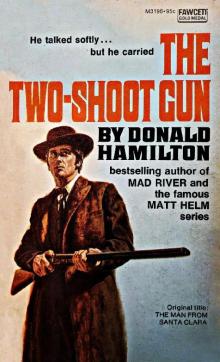 The Two-Shoot Gun
The Two-Shoot Gun Mad River
Mad River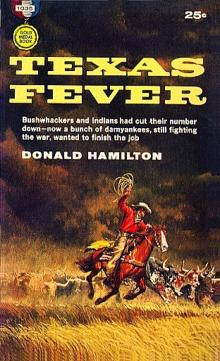 Texas Fever
Texas Fever Ambush at Blanco Canyon
Ambush at Blanco Canyon The Big Country
The Big Country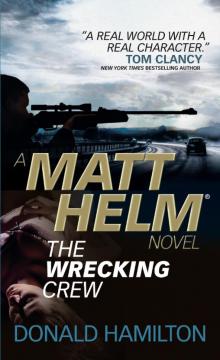 The Wrecking Crew
The Wrecking Crew The Devastators mh-9
The Devastators mh-9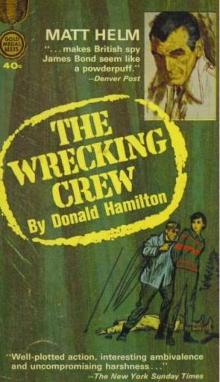 The Wrecking Crew mh-2
The Wrecking Crew mh-2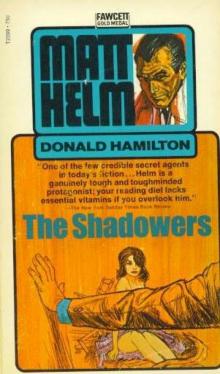 The Shadowers mh-7
The Shadowers mh-7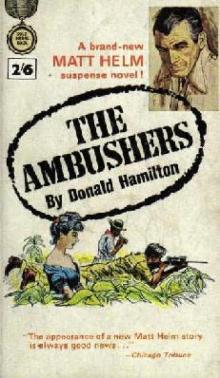 The Ambushers mh-6
The Ambushers mh-6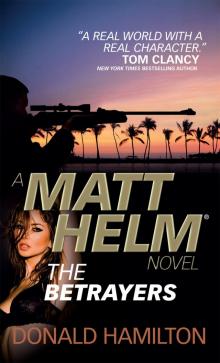 The Betrayers
The Betrayers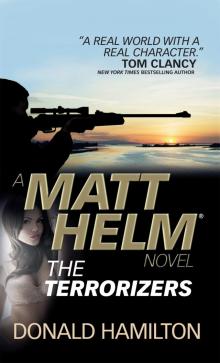 The Terrorizers
The Terrorizers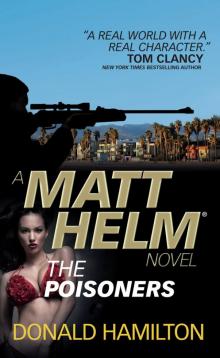 The Poisoners
The Poisoners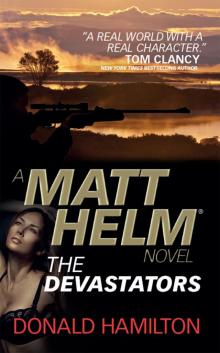 The Devastators
The Devastators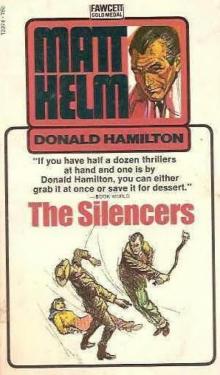 The Silencers mh-5
The Silencers mh-5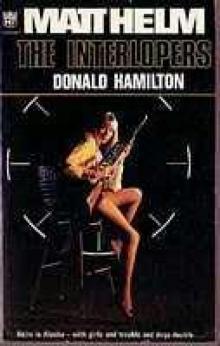 The Interlopers mh-12
The Interlopers mh-12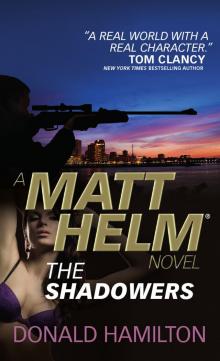 The Shadowers
The Shadowers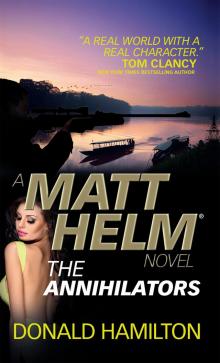 The Annihilators
The Annihilators The Vanishers
The Vanishers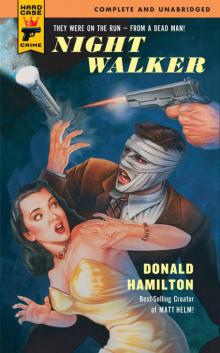 Night Walker
Night Walker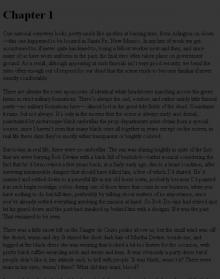 The Revengers
The Revengers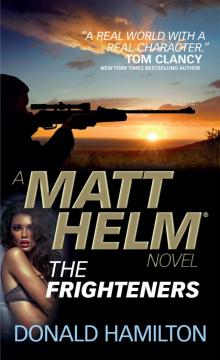 The Frighteners
The Frighteners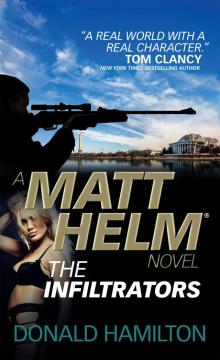 The Infiltrators
The Infiltrators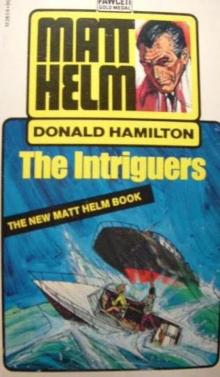 The Intriguers mh-14
The Intriguers mh-14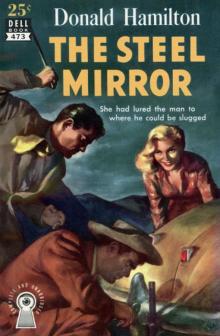 The Steel Mirror
The Steel Mirror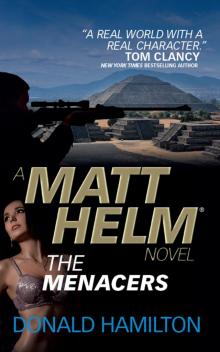 The Menacers
The Menacers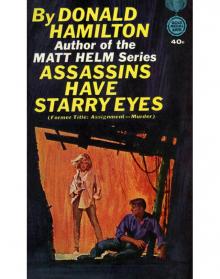 Assassins Have Starry Eyes
Assassins Have Starry Eyes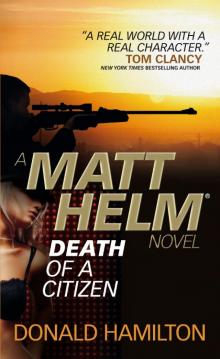 Death of a Citizen
Death of a Citizen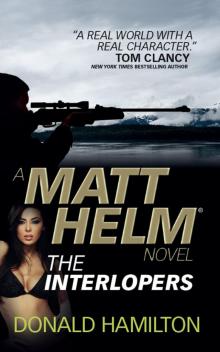 Matt Helm--The Interlopers
Matt Helm--The Interlopers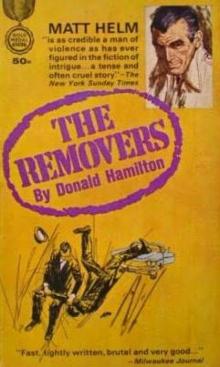 The Removers mh-3
The Removers mh-3 The Demolishers
The Demolishers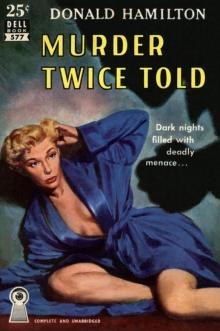 Murder Twice Told
Murder Twice Told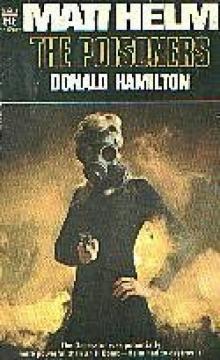 The Poisoners mh-13
The Poisoners mh-13 The Ambushers
The Ambushers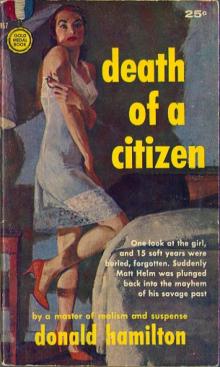 Death of a Citizen mh-1
Death of a Citizen mh-1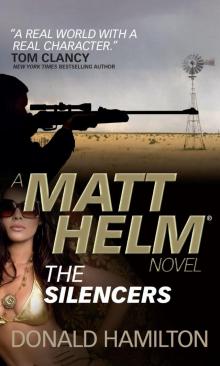 The Silencers
The Silencers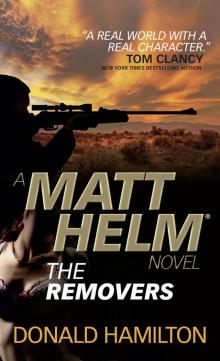 The Removers
The Removers The Intimidators
The Intimidators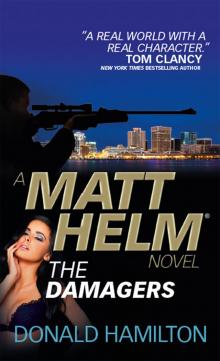 The Damagers
The Damagers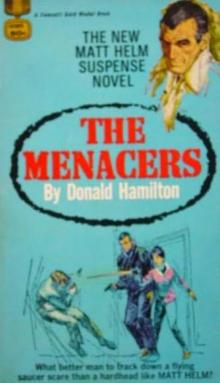 The Menacers mh-11
The Menacers mh-11 The Retaliators
The Retaliators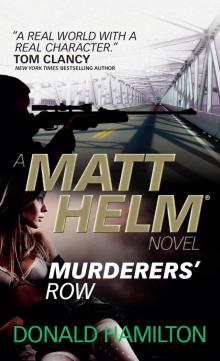 Murderers' Row
Murderers' Row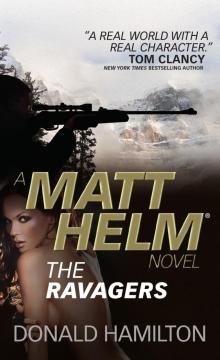 The Ravagers
The Ravagers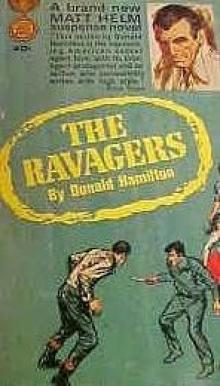 The Ravagers mh-8
The Ravagers mh-8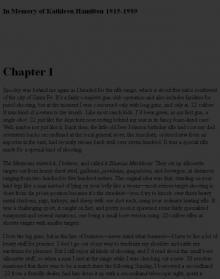 The Threateners
The Threateners The Betrayers mh-10
The Betrayers mh-10